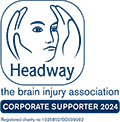The story
Our client was a married father of three, who had an active lifestyle and worked full-time as a Sales Director for a large energy company. He started to experience tremors in his hands and was diagnosed with early onset Parkinson’s Disease. He underwent deep brain stimulation surgery to try to improve his symptoms; sadly however, the surgery caused severe complications that left him disabled and dependent on others.
The details
Our client was aged 39 when he was diagnosed with early onset Parkinson’s Disease. His symptoms got progressively worse, despite being treated with medication. In September 2006, he was advised to undergo bilateral subthalamic nucleus deep brain stimulation (DBS) surgery and was told that the procedure would enable him to work and maintain his current lifestyle for longer.
DBS surgery is an elective surgical procedure in which electrodes are placed on both the left and right sides of the brain through small holes made at the top of the skull. The electrodes are connected by long wires that travel under the skin and down the neck to a battery-powered stimulator under the skin of the chest. When turned on, the stimulator sends electrical pulses to regulate the nerve signals causing tremors, rigidity, and other symptoms.
Our client underwent DBS surgery in 2007 and was subsequently monitored and prescribed medications to help manage his condition. Sadly, his condition deteriorated significantly:
- he was no longer able to work or drive
- his balance and mobility were seriously reduced, resulting in falls
- he became reliant on a wheelchair
- he developed a speech impairment, which impacted his ability to eat and drink and resulted in frequent choking episodes
- his memory was affected
- he experienced insomnia, hallucinations, and nightmares.
All these symptoms meant he required care and assistance with every area of daily living and became largely housebound, which took a toll on his mental health. His wife became his carer and the main breadwinner to support their three young sons.
In May 2022 our client received a letter from University Hospitals Birmingham NHS Foundation Trust confirming that the left DBS electrode was not placed in the optimal position and was 5mm away from the target area, which meant the treatment had not produced the best result and the stimulation may have caused side effects. It was also confirmed that his medications had not been properly managed for nearly 15 years and there had been missed opportunities to increase his medications over the years.
After this, the doctors changed his medication, which helped to improve but not alleviate all his symptoms, including tremors, speech, and balance.
The impact
Our client’s life, and that of his family, has been significantly impacted by the substandard treatment and care he received, and our client has said that he was left in a black hole of despair and isolation because of the failings of the trust.
How we helped
Shoosmiths has been instructed to pursue a clinical negligence claim against the trust on our client’s behalf. At this stage, it is unclear how many patients who were diagnosed with Parkinson’s Disease have received substandard treatment and care.
Shoosmiths’ Kashmir Uppal, a specialist clinical negligence partner, said:
“Our client was contacted following an independent review that was commissioned by the trust and which reported in November 2021. The review’s executive summary makes for concerning reading as it states that most patients receive little or no benefit from the DBS surgery.”
“It also describes the unit as “dysfunctional” and as having systemic failures. It is a matter of grave concern that our client suffered years of symptoms that robbed him of any quality of life because of a dysfunctional unit, and that he only discovered the truth in 2022.”
What our client said
“I trusted the trust’s surgeon and neurology unit completely and was left in no doubt that the DBS procedure should help alleviate my symptoms and that I was a good candidate for this procedure. It is only thanks to the investigation carried out by external experts that I was eventually informed of the surgical failings and the lack of adequate medication being given to me between 2007 and 2022.”
“Kashmir and her team at Shoosmiths have been completely supportive and understanding of the problems I have experienced. I would highly recommend them as their skills, knowledge and strength have helped me navigate through what has been a really difficult time.”
Disclaimer
This information is for educational purposes only and does not constitute legal advice. It is recommended that specific professional advice is sought before acting on any of the information given. © Shoosmiths LLP 2024

















